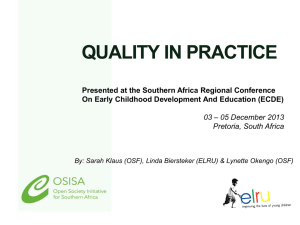Small Steps, Big Futures
advertisement
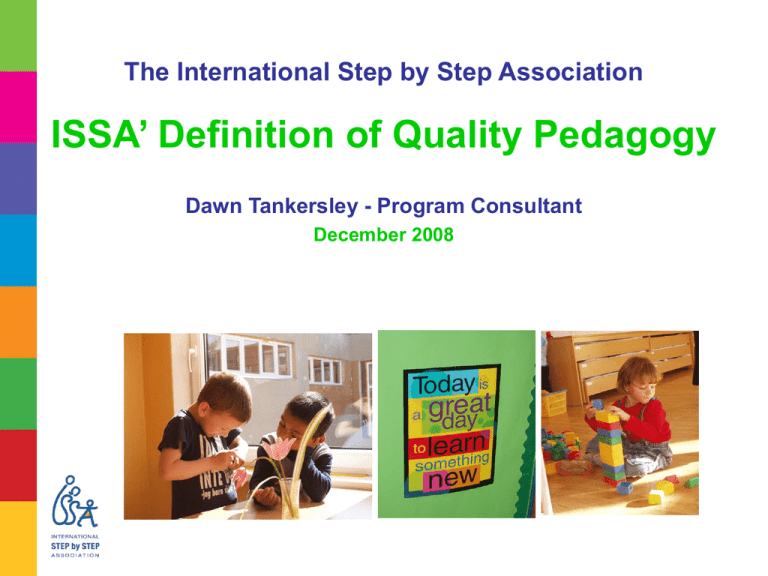
The International Step by Step Association ISSA’ Definition of Quality Pedagogy Dawn Tankersley - Program Consultant December 2008 Documents Used in Developing ISSA Pedagogical Standards • • • • • International documents European documents Research Other similar documents (standards) Other materials (methodologies) Rights Based Approach • Access to free and compulsory education • Equality, inclusion and non-discrimination • The right to quality education, content, and processes Documents Used in Developing ISSA Pedagogical Standards International Documents • UN Convention on the Rights of the Child • UN Convention on the Rights of Persons with Disabilities • Education for All • Millennium Development Goals • Salamanca Statement • Democracy and Diversity: Principles and Concepts for Educating Citizens in a Global Age (2005) • OECD. (2008). Trends Shaping Education • Schools for the 21st Century – Analysis of Public Consultation. (2008) • Delors, J. (1996). Learning: The Treasure Within- Report to UNESCO of the International Commission on Education for the Twenty-first Century. Documents Used in Developing ISSA Pedagogical Standards European Documents • Children in Europe (2008) Young Children and Their Services: A Children in Europe Policy Paper • DECET (2007). Making Sense of Good Practice. • Key Competences for Lifelong Learning – a European Reference Framework (2004) • Improving the Quality of Teacher Education. (2007) Communication from the Commission to the Council and the European Parliament. • Commission Staff Working Paper: Schools for the 21st Century . SEC(2007)100. 9 Documents Used in Developing ISSA Pedagogical Standards RESEARCH • OECD. (2001 and 2006). Starting Strong Early Childhood Education and Care I and II. • Center for Advanced Study of Teaching and Learning (CASTL). • Effective Pre-School and Primary Education 3–11 Project (EPPE 311), REPEY (2002) Researching Effective Pedagogy in the Early Years: Research Report RR356. Department for Education and Skills. • “Preschool Experiences in 10 Countries: Cognitive and Language Performance at Age 7”. Montie, J., Xiang, Z., & Schweinhart, L (2006) Researching Effective Pedagogy in the Early Years Practitioners supported the children in making greater developmental progress than others in less effective centres through: * adult-child verbal interactions; * differentiation and formative assessment; * parental partnership and the home education environment; Iram Siraj-Blatchford, Kathy Sylva, Stella Muttock, Rose Gilden, Danny Bell Researching Effective Pedagogy in the Early Years Siraj-Blatchford and Sylva (2004) in a summary of the Effective Provision of Preschool Education (EPPE) and the Researching Effective Pedagogy in the Early Years (REPEY) studies point out the most effective settings for intellectual, social and dispositional outcomes are where teachers and children engage in sustained shared thinking (pg. 1). EPPE studied 2800 children 141 preschool centers and followed them through 11 years of age. Sustained Shared Thinking * A co-construction of knowledge that happens in an interaction between a child and the teacher when each of them is involved and that the content is in some way instructive. *Freely chosen play activities provide the best opportunities to extend children’s thinking *It can either be initiated by the adult or the child.Settings where there is an equal balance of adult initiated and child initiated activities get the best results. When the child initiates it is necessary that the teacher extend it. *Sustained shared thinking can also go on among peers and also contributes to children’s learning. Center for Advanced Study of Teaching and Learning (CASTL) – 2006 * The enjoyment and emotional connection that teachers have with children * The teacher’s sensitivity and responsivity to children’s cognitive and emotional needs * The degree with which teachers place an emphasis on children’s interests, motivations, and points of view * The teacher’s respect for children’s autonomy to participate and initiate activities collectively and separately predict children’s academic outcomes and engagement in classrooms across all grade levels. (Pianta, 2006) Preschool Experience in 10 countries • The amount of adult-child interaction was positively related to children’s age 7 language scores where whole group activities group response and/or adult centered teaching were relatively infrequent. • Children who were in preprimary settings in which free choice activities predominated had significantly better language performance at age 7 than those in settings in which group activities predominated. Preschool Experiences in 10 Countries: Cognitive and Language Performance at Age 7”. Montie, J., Xiang, Z., & Schweinhart, L (2006) Finland, Greece, Hong Kong, Indonesia, Ireland, Italy, Poland,Spain, Thailand, U.S. Documents Used in Developing ISSA Pedagogical Standards Other Similar Documents/Standards • Association for Childhood Education International. (2006). ACEI: Global Guidelines for the Education and Care of Young Children in the 21st Century. • Centre for Early Childhood Development and Education (CECDE). (2006). Full and Part-time User Daycare Manual. Dublin: Centre for Early Childhood Development and Education • Centre for Experiential Education. (2005). Well-being and Involvement in Care Settings. A Process-oriented Self-evaluation Instrument • Classroom Assessment Scoring System (CLASS). (2006) • Early Childhood Environment Rating Scale (ECERS-R) (2005). • National Association for the Education of Young Children (NAEYC). (2003). NAEYC Early Childhood Program Standards and Accreditation Criteria: The Mark of Quality in Early Childhood Education Similar Materials - Standards Document Program/ Teacher Age Level Main Focus Use ACEI P 2-5 Broad + Special needs PD CECDE P Infants, Childminders, Daycare, K Broad PD Center for Experiential Education Daycare daycare Well-being/ involvement PD CLASS T P-K through interactions primary ECERS P Infant/toddler Preschool Primary Environment+ Research, certification, curriculum 0-5 Broad NAEYC P Research, PD PD Certification, PD ISSA’s Document Strongly Emphasizes Role of Teacher in Promoting: • Life-long learning especially associated with civic and personal development • Interactions and “sustained shared thinking” • Promoting well being and child involvement • Diversity, inclusion, sense of identity • Voice, participation and initiative of the child • Voice, participation and initiative of the family Documents Used in Developing ISSA Pedagogical Standards Examples of Other Materials Including Methodologies Creating Child Centered Classrooms: all volumes The Early Years Foundation Stage: Setting the Standards for Learning, Development, and Care for children from birth to 5. (2007). Epstein, A.S. (2007). Essentials of Active Learning in Preschool: Getting to Know the High Scope Curriculum. Epstein, A.S. (2007). The Intentional Teacher: Choosing the Best Strategies for Young Children’s Learning Types of Publications ISSA will produce on the Standards • Posters for classrooms showing all focus areas and standards • Short publication for information and advocacy. Also posted on ISSA website • Book and CD Rom for practitioners and for professional development Short Publication • • • • • Description of focus area Standards Indicators How children benefit Few examples of how standard looks with different age groups • Pictures Book (methodology) and CD Rom version: Each standard will have its own chapter: • Longer description on why this standard is important including the theory, opinions from experts, and research that support it • References associated with the standard • What other standards from ISSA’s Definition of Quality it is connects with • Description of each indicator • How children benefit from each indicator • Examples of how each indicator looks for different age groups This is what we work for! dtankersley@issa.hu www.issa.nl
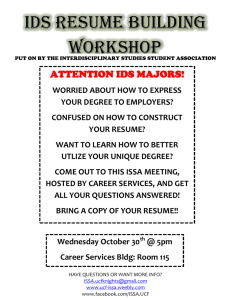
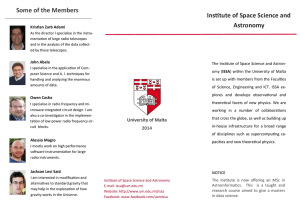
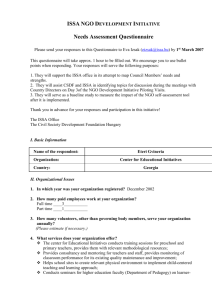
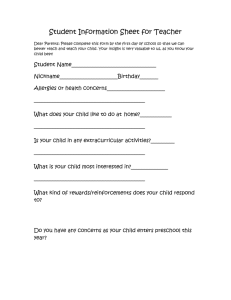

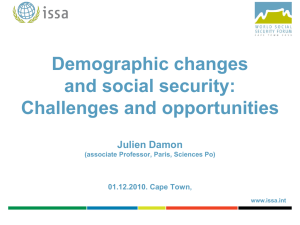
![Service Coordination Toolkit Transition Planning Checklist [ DOC ]](http://s3.studylib.net/store/data/006933472_1-c85cecf2cfb8d9a7f8ddf8ceba8acaf8-300x300.png)

